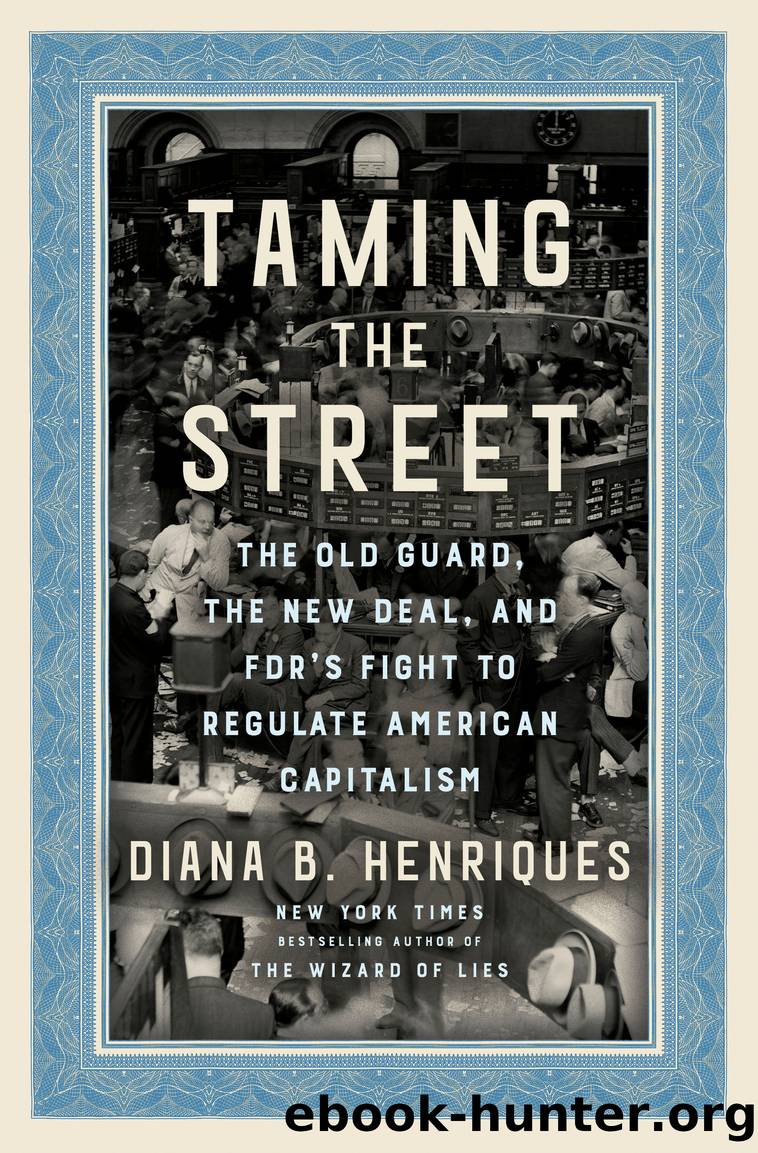Taming the Street by Diana B. Henriques

Author:Diana B. Henriques [Henriques, Diana B.]
Language: eng
Format: epub
Publisher: Random House Publishing Group
Published: 2023-09-12T00:00:00+00:00
* * *
â
After a springlike Sunday that had sent New Yorkers scurrying to parks and playgrounds, the morning of Monday, January 31, was wet and cold. Charles Gayâs car carried him from his Brooklyn home into the narrow streets of lower Manhattan and delivered him to 11 Wall Street. Today, he would bring the Conway committee report before the board of governors. If he had counted his votes correctly, the report would be approved unanimously and he could get people started drafting the constitutional changes it would require. But with Dick Whitney silent and stubborn, Gay couldnât take anything for granted.
After the closing bell, the governors began to trickle into the magnificent chamber where they met. Charles Gay climbed up onto the podium and called the meeting to order. With good parliamentary order, a resolution was put forward to approve the Conway committeeâs report and authorize Gay to name a group to draft the constitutional amendments necessary to implement it. Reformers, led by the members from the large retail âwire houses,â spoke of the merits of having a professional chief executive, a better relationship with the SEC, and a more progressive public image. Nods and expressions of agreement all around the chamber encouraged Gay to hope for quick and emphatic approval.
Then Dick Whitney rose in opposition, dispassionate and arrogant as ever. Journalist John Brooks, writing later with the benefit of the memories of some of the men in the room, said Whitney urged the board to accept the report âonly in a general way, leaving leeway for rear-guard struggles on each individual provision.â That was how he had fought in 1933 and 1934; he hadnât killed FDRâs laws but he had surely shaped their final form and slowed Wall Streetâs acceptance of them. The governors could do the same thing again, he told them. âSo great was Whitneyâs eloquence that for a moment it appeared he might still win the day,â Brooks wrote.
Charles Gay had heard enough.
Since taking office in May 1935, he had bowed repeatedly to Whitneyâs forceful style. He had watched Whitney hijack the SEC negotiations in November. Privately, he argued that he could do little in the face of Whitneyâs broad support on the floor. But support for him in the boardroom had ebbed dramatically; not even old guard stalwarts like former NYSE chairman Harry Simmons rose today to support Whitneyâs arguments. Gayâs hands were no longer tied; this time, he could act.
Gay suddenly put down his gavel and walked down the podium steps. There was a murmur of surprise at this unusual and unexpected move. Was their beleaguered president walking out, bowing once more to Whitney?
No, Gay was simply setting aside his presidential status to address them as an equal. With a warmth Whitney lacked, Gay pleaded with them to reject the delaying games of the past and act, firmly and decisively. The reputation of the NYSE was on the line. This was no time for a display of bad faith. If anyone could not vote
Download
This site does not store any files on its server. We only index and link to content provided by other sites. Please contact the content providers to delete copyright contents if any and email us, we'll remove relevant links or contents immediately.
The Secret History by Donna Tartt(16675)
The Social Justice Warrior Handbook by Lisa De Pasquale(11495)
Thirteen Reasons Why by Jay Asher(7806)
This Is How You Lose Her by Junot Diaz(5802)
Weapons of Math Destruction by Cathy O'Neil(5053)
Zero to One by Peter Thiel(4840)
The Myth of the Strong Leader by Archie Brown(4796)
Promise Me, Dad by Joe Biden(4459)
Beartown by Fredrik Backman(4438)
Stone's Rules by Roger Stone(4426)
How Democracies Die by Steven Levitsky & Daniel Ziblatt(4425)
The Fire Next Time by James Baldwin(4354)
100 Deadly Skills by Clint Emerson(4090)
A Higher Loyalty: Truth, Lies, and Leadership by James Comey(4044)
Rise and Kill First by Ronen Bergman(4026)
The David Icke Guide to the Global Conspiracy (and how to end it) by David Icke(3899)
The Farm by Tom Rob Smith(3882)
Secrecy World by Jake Bernstein(3792)
The Doomsday Machine by Daniel Ellsberg(3742)
